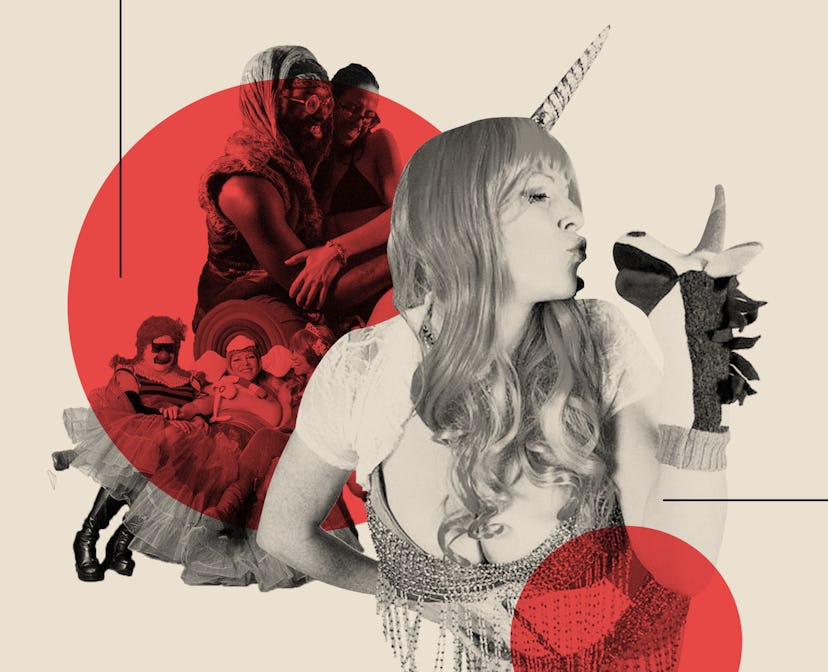Sex & Relationships
Polly Superstar On What Orgies Can Teach Us About Socializing During COVID
"The truth is, it's more about feeling than science."

Polly Superstar is the creator of the sex-positive community Kinky Salon and author of the book Polly: Sex Culture Revolutionary. Here, she talks about the lessons on communication and protecting your health that we can all take from polyamorous groups and organized sex parties as society starts to reopen, but COVID is still active. As told to Emma McGowan.
Since the AIDS epidemic, the sex culture community has developed a high level of communication around how to navigate activities, how to assess risk, figuring out your risk tolerance, and limiting risk. Assessing risk is about feeling comfortable. It's as much to do with feeling safe as it has to do with scientifically reducing your risk. For example, I don't call it safe sex; I call it safer sex — because there is no safe sex. There's no “safe” activity; you’re only mitigating your risk. And that's going to continue as people open up their social bubbles.
The expansion of the COVID pod (or whatever you want to call it) is very much like how you would navigate polyamory. As you expand your circle of trust, you have to have these awkward conversations, which can be tricky. One way to do it is with a one to five risk-assessment scale. You get together as a group and discuss the activities that are important to you, then rank them each from one to five, with one being low to no risk and five being high risk.
Then, if someone in the group does something high risk, they can say, “I had a five experience last weekend, just wanted to let you know. So what does that mean for us all now? How do we move forward with this? Do you want me to stay away for a while, or are people comfortable with that?”
Within the context of COVID, it might be that somebody hugged a healthcare worker who is in contact with people with COVID every day. But you don't have to necessarily go into explicit details of the things that happened, because you can just use your scale. It’s about creating avenues for those conversations and talking them out.
We slightly shifted topics, from orgies to COVID.
Another option is to use the safer sex elevator speech. It’s basically a script for having a conversation about safer sex when you first meet somebody, and you’re interested in exploring something sexual with them: “When were you tested? What have you done since you were last tested? What are your safer sex practices? What is your relationship status? And what activities do you engage in?”
For example, a group of friends of mine is organizing a camping trip. They're all texting things like, "OK, here's where I'm at. I got COVID tested on this date. I just did this thing." They're all sharing their little elevator pitch, and one of them is like, "OK, I'm high risk, so please make sure that you all stay out of my camp, and I'll come to you, and I'll bring my own chair."
It's hilarious how good we are at this, you know? We slightly shifted topics, from orgies to COVID. But there are no orgies happening right now, beyond the small COVID pod orgies. It's very sad.
The truth is, it's more about feeling than science.
Another communication tool is the BDSM checklist. Basically, you both go through a list of sexual activities and say how interested you are in trying them. In the context of BDSM it would be like, nipple clamps, whips, wearing leather, or whatever, right? But for COVID, it could be like, "Oh, I want to hang out in your backyard." Or, "Would you go to a bar?" Or, “Are you interested in a camping trip?"
Then you can discover what you're both interested in. Try asking, "Hey, do you want to go to a bar with me?" It gives you the ability to navigate that without having to face a lot of nos.
A checklist is a great way to make sure you’re on the same page with your COVID pod. There are some things — whether to wipe down groceries with disinfectant, for example — that people are doing that other people are like, "Yeah, that's not important to me."
Say I'm not disinfecting my groceries, and then someone in the pod is like, "Oh, I see they're not disinfecting their groceries, that actually I find quite alarming, and I'm upset by that." Then you can negotiate. The truth is, it's more about feeling than science. If you don't feel safe, you don't feel safe.
This article was originally published on